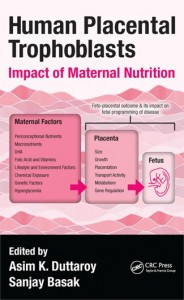| Title | Human Placental Trophoblasts |
| Subtitle | Impact of Maternal Nutrition |
Language: English
Pages: 444
Binding: Hardcover
Type of work: Research, Review
Subject matter: Medical Science
Contribution of Saumitra Chakravarty: Co-author (writer of Chapter 25, namely, Placental Gene Expression in Pathological Pregnancies)
First publication: 3 November 2015
Publisher: Taylor & Francis Group, 6000 Broken Sound Parkway, NW Suite 300, Boca Raton, FL 33487, USA
Online shopping (international): Amazon; CRC; Researchgate
Synopsis of the book:
The book explores the vital roles of trophoblasts play in fetal growth and pregnancy, giving you new insight into the modulation of placental trophoblast functions by nutrients. It also reviews the role of fatty acids, folic acids, and specific vitamins in this aspect. The book highlights the critical role of nutrients on human placental development and its’ in utero programming effects on the development of chronic diseases such as type 2 diabetes, cardiovascular diseases, hypertension, and obesity in later life.
The book begins with discussions of the central process of placentation and its regulation on size and growth of the fetus. It also covers the effects of key macronutrients on placental growth, metabolism, transport, and secretory function. The text details important vitamins and few micronutrients and their roles in the feto-placental growth and development. It includes information on the influence of maternal lifestyle and environmental factors on regulation of the growth, metabolism and gene expression in the feto-placental unit. A review of the genes linked to the process of placentation rounds out the coverage.
An examination of a broad range of evidence in the areas of placental growth, function, and its impact on feto-placental outcome, the book presents new knowledge on nutrition and its relevance with early human development. This includes not only the effects of maternal nutrients on possible neonatal growth and development but also their regulation by maternal lifestyle associated factors. A fine blending of epidemiology, clinical nutrition, perinatal and neonatal medicine, and biochemistry and molecular biology areas of research activities, the book helps you to understand the impact of maternal nutrition on placentation and its relevance with pregnancy outcome and fetal programming of adult health and disease.
Abstract of Chapter 25 (Placental Gene Expression in Pathological Pregnancies):
The heterogeneity of placental gene expression profile, both spatially and temporally having potential implications in the development and propagation of different pregnancy-related pathologies, has been reported. In addition, changes in DNA methylation may contribute to the altered expression of genes linked to pathological pregnancies. In fact, epigenetics provides an important gene expression regulatory mechanism in placenta. Therefore, it is reasonable to look for the potential association of placental insufficiency (e.g., preeclampsia and miscarriage) with the genes regulating those processes. Placental immunology may be considered herewith while discussing the genetic background of the disorders of placental insufficiency. Application of gene expression profiles and knowledge of epigenetic anomalies may become integral parts of diagnostic procedures and assisted reproductive technologies in the near future. This chapter deals only with placental gene expression in pathological pregnancies
